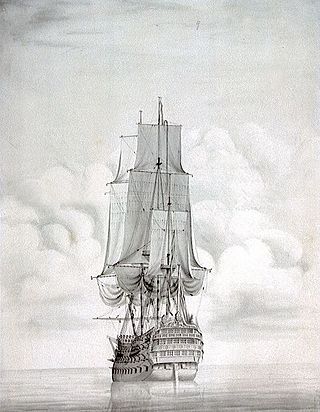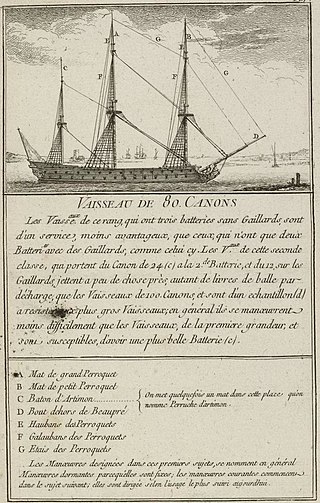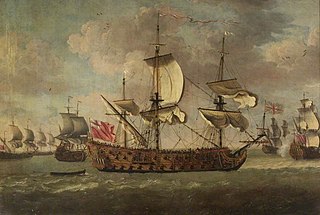
HMS Vanguard was a 90-gun second-rate ship of the line of the Royal Navy, built at Portsmouth Dockyard and launched in 1678.

The demi-cannon was a medium-sized cannon, similar to but slightly larger than a culverin and smaller than a regular 42 pounds (19 kg) cannon, developed in the early 17th century. A full cannon fired a 42-pound shot, but these were discontinued in the 18th century as they were seen as too unwieldy. The lower tiers of 18th century English warships were usually equipped with demi-cannons.

HMS Resolution was a 70-gun third-rate ship of the line of the Royal Navy, launched at Harwich Dockyard on 6 December 1667. She was one of only three third-rate vessels designed and built by the noted maritime architect Sir Anthony Deane.

HMS Resolution was a 74-gun third-rate ship of the line of the Royal Navy, launched on 14 December 1758 at Northam.
HMS Firm was a 60-gun fourth rate ship of the line of the Royal Navy, launched on 15 January 1759 at Blackwall Yard, London.

HMS Resolution was a 74-gun third rate ship of the line of the Royal Navy, designed by Sir Thomas Slade and built by Adam Hayes at Deptford Dockyard and launched on 12 April 1770. The ship had a huge crew of 600 men. As one of the Royal Navy's largest ships she took part in seven major naval battles.

Formidable was an 80-gun ship of the line of the French Navy, launched in 1751.

HMS Falkland was a 50-gun fourth-rate ship of the line of the Royal Navy, built by Holland of New Castle, New Hampshire, and purchased by the navy in 1696.

HMS Swiftsure was a 70-gun third-rate ship of the line of the Royal Navy, built by Sir Anthony Deane at Harwich, and launched in 1673. By 1685 she had been reduced to a 66-gun ship.

The Prince Royal was a 55-gun royal ship of the English Royal Navy. It was later rebuilt and renamed HMS Resolution.

The ship that became the first HMS Resolution was a 50-gun third-rate frigate built under the 1652 Programme for the navy of the Commonwealth of England by Sir Phineas Pett at Ratcliffe, and launched in 1654 under the name Tredagh.

President was a 38-gun fourth rate frigate of the Royal Navy, originally built for the navy of the Commonwealth of England by Peter Pett I at Deptford Dockyard, and launched in 1650.
HMS Albemarle was a 90-gun second rate ship of the line of the Royal Navy, launched on 29 October 1680 at Harwich.

HMS Boyne was an 80-gun third-rate ship of the line of the Royal Navy, launched at Deptford Dockyard on 21 May 1692.

HMS Russell was an 80-gun third rate ship of the line of the Royal Navy, launched at Portsmouth Dockyard on 3 June 1692.

HMS Humber was an 80-gun third rate ship of the line of the Royal Navy, launched at Hull on 30 March 1693.

HMS Canterbury was a 60-gun fourth-rate ship of the line of the Royal Navy, launched at Deptford on 18 December 1693.

HMS Windsor was a 60-gun fourth rate ship of the line of the Royal Navy, launched at Deptford on 31 October 1695.

HMS St Albans was a 50-gun fourth rate ship of the line of the Royal Navy, built at Rotherhithe and launched on 10 December 1706.
HMS Resolution was a 70-gun third rate ship of the line of the Royal Navy, built by Joseph Allin the elder at Deptford Dockyard, and launched on 25 March 1708.














